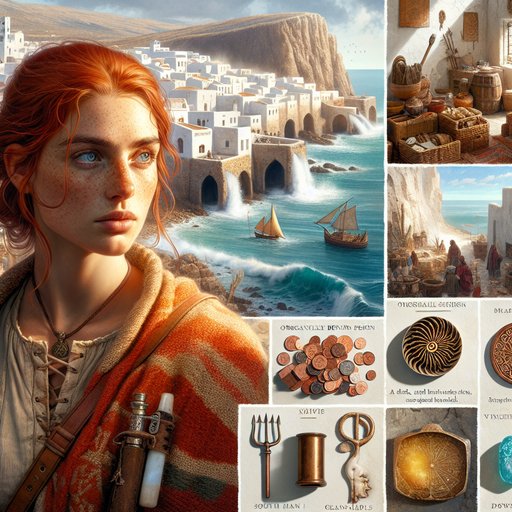CHAPTER 3 - When the Wind Refuses to Sing

Trapped in the singing sea cave as the tide turns, Barbra is released at the last moment by unseen guardians who warn her off and seal the entrance, leaving her quest at a dead end. Days of silence from locals and a blocked fissure force her to step back, so she changes into a floral jacket and Louboutin pumps and joins her teacher for rooftop tea and drumming in Hadibu, trying to relax. The night’s rhythms echo the cave’s song and she notes a familiar trident-spiral motif, but the thread slips away. At dawn she trades pumps for Asics and a leather jacket and hikes alone into the Homhil plateau. There, in the hush of dragon’s blood trees and the distant shimmer of the sea, she discovers a limestone lip with pinholes that accept her blue glass shard, tuning the wind and revealing a resin-sealed niche. Inside she finds a goatskin satchel with palm-leaf diagrams—new clues suggesting the Covenant’s hidden network of wind-harps where trees capture sea mists. As she examines the find, the wary Socotri boy and an older woman with a ring bearing the trident-spiral appear, warning that the wind exacts a price. The woman offers a path forward if Barbra vows to honor the Covenant, pointing toward a fog-drinking grove and asking if she dares, leaving Barbra at a charged decision.
The dark in the cave thickened until it felt grainy, a texture against her cheeks and tongue, a velvet suffocation threaded with salt. Water shouldered through the clefts, low and feline at first, then swelling into a breath that pressed against her shins with intent. Barbra cupped the blue shard in her palm like a sliver of sky she refused to drop, thinking of her grandmother’s voice in winter storms: breathe, then act. When the wind faltered for one heartbeat, she pressed her shoulder under the stone that had scraped shut, finding a seam with her fingers, groaning as it refused, refused, refused.
A whisper spoke her name close enough to stir her hair, and the weight shifted just enough for a blade of moonlight to slide in and cut the darkness into two livable pieces. She burst through on the second try, gasping at the night and the wet glitter of the shore, scrapes on her forearms singing in salt. A tall silhouette stepped back from the opening, face hooded, ring flashing the faintest blue where it caught the sliver of sky leaking past clouds. “You were not asked,” the figure said in careful Arabic, the vowels changed by island wind.
“Silence, or the island will not sing for you again.” When Barbra blinked, clearing water from her lashes, the person and the boy-sized shadow beside them had already melted into limestone and darkness. By morning, the fissure had been wedged with a slab so neat it looked like architecture, the cave sealed as if the sea had never borrowed a voice. The blowhole’s hum failed to return even when the tide dragged its skirts far out, leaving exposed rock wrinkled like an old hand. People turned their faces from her questions, the boatman who’d once laughed at her now suddenly needed to coil five more ropes.
The wary boy was nowhere, and even the teacher who’d translated her scrap of writing pressed his palm down over her coin and said only, “Wait.” It felt, in her bones, like someone had shut a door behind her and pocketed the key. After two days of pacing the whitewashed rental and staring at the shard propped on her windowsill, Barbra admitted she was a hair’s breadth from fury. She changed for that instead, pulling on tight jeans and a fresh white tank, the floral denim jacket with faded roses to soften the hard day, and her Louboutin pumps because sometimes grace was a choice you made with your feet. Her red hair she combed into an unbothered wave, freckles she would not think about because the night would not care, and she dabbed the faintest lip balm only out of habit.
The teacher met her on a rooftop where tea steamed in small glasses and a city of goats and satellite dishes breathed below. He offered a grin and a clumsy bow at the sight of her shoes. “You will break their hearts and their stones,” he said, and she laughed because laughter was the only thing she hadn’t tried on the island yet. Drummers began without warning, a heartbeat drawn tight over wood, a low goat-skin tremor that set her shoulders loose.
The rhythm called strangers to their feet and then knit them until there were no strangers at all, and Barbra let herself be gathered into a circle of women and pushed, gently, into moving. Her mind emptied until only breath and ankles existed, her careful steps precise on the uneven roof, protecting the red soles she’d carried across continents. In a pause between pieces she saw it: a faint trident-spiral painted near the rim of a drum, three prongs curling like a stylized current. The drummer’s boyish grin faltered when she touched the symbol, but he only shrugged and said, “Currents,” tapping his chest where a ring would be if he wore one, and then he was called away.
She fell asleep with the drumbeat still tucked inside her ribs and woke before dawn with the sea already brightening like a vein under skin. The pumps went back in their dust bag with a pat, pride and promise, and she laced her blue-and-white Asics, slid into the scuffed black leather motorcycle jacket that had seen Paris rain and Andean dust, and shouldered her canteen. The island truck dropped her near the Homhil trailhead with a nod and a joke about wind lifting red-haired girls, and then it was only her and the plateau. She took the path with the gait long walks had given her, easy and efficient, letting the granite underfoot drum its own steady tempo, calves warming, freckles pulling heat the way stories pulled her.
The dragon’s blood trees rose ahead, umbrella crowns against the early sky, their shadow a geometric lace on pale stone. Homhil held a quiet she could drink, a hush poured from dragon’s blood bowls and the steady shine of the distant sea, blue as a promise no one could keep. Barbra let the small infinity pool hold her feet until the sting of salt turned sweet, then followed a lip of limestone that arced toward a stand of frankincense trees clinging to a scarp. A breath of wind slipped up-slope and found a lip in the rock and thrilled it the way a bottle hums, so softly she might have called it her imagination if the note hadn’t changed when she moved.
Three tiny holes had been bored into the stone with the faithfulness of an artisan’s habit, each spaced like points of her copper coin’s outer marks. Her fingers trembled, ridiculous and precise, slotted the blue shard over the pins, and the hum went true like a tuning fork finding the exact good in the air. The note oriented itself, no louder but certain, drawing her to a cleft she would have walked past, a bird’s mouth in the wall crusted with old resin the color of dried heart blood. This close she could see where hands once pressed: fingerprints frozen in hardened dragon’s blood, old thumb-whorls darkened by dust.
She warmed the resin with her palm and breath, coaxed the seal until a sliver flaked and then unzipped in a red curl, and a niche surrendered a goatskin satchel small enough to hide in a sleeve. The leather smelled of salt and spice and time; inside, palm leaf strips were stitched together with palm fiber, mapped with inks that bled into trumpeting spirals and small hatch marks where trees might be. The trident-spiral returned again and again, not decorative but directive, threading between symbols for mists and holes and the thin blue line of runoff that locals called the sea drinking the cliff. Her breath pinched high in her chest as she smoothed one page against her thigh, translating with the little Socotri she had and guesswork where she didn’t.
A string of tridents marked groves that skinned the monsoon for water and fed it into limestone like a harp’s soundboard, lines connecting them to caves photographed only in the eye, not in film. A circle marked with three dots sat above a crescent—the same marks as her coin—next to words she thought might mean elders, keepers, covenant. The network made a shape when she held the pages together: the spiral uncoiling inland, a path that wasn’t a path so much as a choreography of wind. She looked over her shoulder and felt the plateau’s hush change flavor, as if someone had exhaled behind her and had not expected her to hear.
“You weren’t meant to open it alone,” the boy said, no longer wary so much as resigned, his narrow shoulders backlit by the morning. Beside him, an older woman set her staff down with care and lifted her chin, the silver ring on her hand set with a blue fleck like a frozen wave. Her face was not unkind, just mapped by decision, her eyes the color of wet basalt. “There are prices for borrowing what the wind hides,” she said in Arabic softer than the teacher’s, a cadence that made Barbra think of lullabies and warnings carried by corridors of air.
Barbra stood, knees dusty, shard and satchel caught between protective hands that wanted to argue and a heart that did not want to lie. “I don’t want to take,” she said, and the words were clean because they were true. “I want to understand, and I will return whatever I move, even if all I return is knowledge to your keeping.” The woman’s eyes flicked to Barbra’s jacket, to her scarred hands, to the careful way she had laced her shoes, to the way her freckles had browned without vanity, to the way she held her body at a respectful angle. “Integrity is not the same as obedience,” the woman said, but Barbra thought she saw the corner of her mouth consider smiling.
The ring flashed again as the woman lifted her hand and pointed past the frankincense grove where the cliffs softened into a green seam the color of verdigris. “Where trees drink the sea and give it back, the instrument waits,” the woman said, and the word instrument turned in Barbra’s chest like a key she’d been carrying without knowing why. “We will show you the next door if you promise a price only you can set, and keep.” Wind climbed the scarp in a cold hand then, threading the pins in the limestone behind her and plucking the shard so that it sang the same note as the cave had at dawn. Barbra felt it in her teeth and the arches of her feet, familiar and challenging, daring her to step into it like a song.
What price does the wind ask of you, Barbra Dender, and are you willing to pay it?


































































